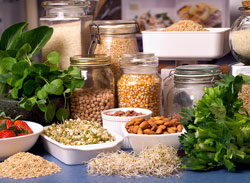
Magnesium is important for optimal health. Our bodies need magnesium to promote healthy bones (magnesium helps absorb calcium), maintain normal muscle and nerve function, maintain heart rhythm and a healthy immune system, help regulate blood sugar levels, and promote healthy blood pressure. A deficiency in magnesium, although rare in this country, can cause muscle spasms, cardiovascular disease, diabetes, high blood pressure, osteoporosis, migraines, anxiety disorders, and cerebral infarction. According to Dr. Komaroff of Harvard Medical School, the daily requirement of magnesium for women ages 19-30 is 310 milligrams (mg) and over 30 is 320 mg; and for men ages 19-30 is 400 mg and over 30 is 420 mg.
The good news is that it’s easy to get lots of magnesium in your diet. Many plant-based foods are rich in magnesium including:
Resources:
USDA National Nutrition Database
www.AskDoctorK.com
www.Healthaliciousness.com
The good news is that it’s easy to get lots of magnesium in your diet. Many plant-based foods are rich in magnesium including:
- Dark leafy greens per 1 cup cooked: spinach = 157 mg, Swiss chard – 150 mg.
- Nuts and seeds per ½ cup: squash and pumpkin seeds – 382 mg, sesame seeds – 253 mg, Brazil nuts – 250 mg, almonds – 193 mg, cashews – 207 mg, pine nuts – 169 mg, peanuts – 264 mg, pecans – 60 mg, walnuts – 92 mg
- Beans and lentils per 1 cup: soy beans – 108 mg, black beans – 120 mg, lentils, 71 mg, kidney beans – 74 mg
- Whole grains per 1 cup: quinoa – 118 mg, brown rice – 86 mg, oatmeal – 63 mg, whole wheat pasta – 42 mg, whole wheat bread – 24 mg/slice
- Avocados: 1 average (136 g) – 39 mg
- Bananas: 1 medium – 32 mg
- Dark chocolate (70-85%) – ~1 oz (1 square) – 65 mg (yet another reason to eat dark chocolate!)
Resources:
USDA National Nutrition Database
www.AskDoctorK.com
www.Healthaliciousness.com



 RSS Feed
RSS Feed